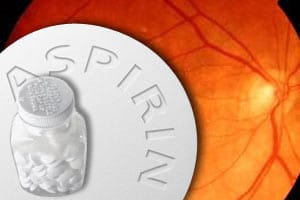
A new study suggests that regular aspirin use is associated with an increased risk of neovascular age-related macular degeneration. The researchers adjusted for age, gender, smoking history, and found the odds ratio for macular degeneration in aspirin users to 2.37, said Jie Jin Wang, PhD, of the University of Sydney, and colleagues. The team made […]
 A new study suggests that regular aspirin use is associated with an increased risk of neovascular age-related macular degeneration.
A new study suggests that regular aspirin use is associated with an increased risk of neovascular age-related macular degeneration.
The researchers adjusted for age, gender, smoking history, and found the odds ratio for macular degeneration in aspirin users to 2.37, said Jie Jin Wang, PhD, of the University of Sydney, and colleagues. The team made further adjustment for body mass index, systolic blood pressure, and cardiovascular disease (CVD) history and found that the association remained, said MedPage Today. The report appears online in the Journal of the American Medical Association (JAMA) Internal Medicine.
Researchers analyzed data from the Blue Mountains Eye Study to review the potential link. The study involved 2,389 Australians ages 49 and older, said MedPage Today. Retinal examinations were conducted every five years and lesions were classified as either neovascular (wet macular degeneration) or geographic atrophy (dry macular degeneration). The Australian study noted that, although a risk was seen, actual causality is uncertain, said MedPage Today, suggesting a need for additional study.
The use of aspirin was reported on a “structured” questionnaire; data on relevant risk factors was obtained through physical examination and history reports, said MedPage Today. The researchers said they did not collect data on aspirin dosage, but noted “most aspirin use in Australia is prescribed at 150 mg daily.”
Of the group, 257 were regular aspirin users and, when compared with non-users, they were older and were typically diagnosed with diabetes, cardiovascular disease, or elevated blood pressure, said MedPage Today. A 15-year follow-up was conducted and age-related wet macular degeneration was found in 63 individuals. Neovascular macular degeneration incidence increased with more frequent aspirin use, from 2.2% in people who never took aspirin, to 2.9% for occasional aspirin use, to 5.8% for routine aspirin use. Aspirin use was not linked with an increased risk for geographic atrophy, the team said, wrote MedPage Today.
Secondary analyses revealed that the risk was four times higher in patients with a history of CVD and those without a polymorphism on CFHY402H, which is a gene involved in the “complement pathway” linked with macular degeneration, MedPage Today explained. The researchers reviewed if other medications often taken by aspirin users, such as acetaminophen and beta-blockers, might influence risk; the results were negative.
We recently wrote that another study linked nonsterodial anti-inflammatory drug (NSAID) painkillers to higher death risks and risks for second heart attacks. The popular pain killers, which are used by millions for headaches, minor pain, arthritis, lowering fever, and reducing swelling, include nonprescription aspirin, ibuprofen (Advil, Motrin), and naproxen (Aleve); prescription medications include COX-2 inhibitors, such as Celebrex (celecoxib).
A statement made in 2007 by the American Heart Association urged physicians to use caution when considering NSAIDs for patients with a history of, or high risk for, cardiovascular disease.
We also recently wrote that another study found a small-to-moderate risk of birth defects in the prenatal use of NSAIDs and that another study that revealed that NSAID use may increase prostate cancer risks. We previously wrote that NSAIDs have long been linked to increased risks of adverse events and were most recently linked to, according to a Harvard research report, increased risks for developing kidney cancer.


